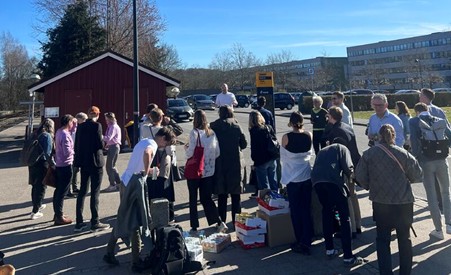The Capital Region of Denmark recently hosted a local stakeholder workshop in Rudersdal, bringing together Danish municipalities and partners from across the North Sea Region to share insights and experiences on advancing shared mobility and mobility hubs.
The event, held at the Mariehøj Kulturcenter, highlighted the benefits around sustainable transport solutions and showed the potential of co-construction through regional collaboration.
ShareDiMobiHub partners also presented their cases and lessons learned in developing shared mobility systems and integrated hub networks. These included insights on business cases, concession models, hub design, governance frameworks, and MaaS integration. Key takeaways from the event included:
- Learning from Flanders: Mpact and Way To Go reflected on the evolution of the mobility hub concept and shared key insights from their experience in developing hub networks across the region. They highlighted the shift from ‘basic mobility’ to ‘basic accessibility’ as a guiding principle, introduced the regional Hoppin branding, and shared lessons from the SOLVA interprovincial mobility strategy.
- Utrecht’s regional Bike-sharing scheme: ShareDiMobiHub lead partner, the Province of Utrecht outlined how they are using concessions and data-driven planning to expand electric shared bike access in underserved areas and employment zones.
- Amsterdam’s integration of shared mobility into public transport ecosystem: The regional transport authority emphasized the importance of embedding shared mobility within wider transit networks and governance systems.
- Rudersdal pilot case in the GEMINI project: This pilot is currently testing the viability of shared mobility hubs in suburban areas like Rudersdal. The project presented early insights from its demonstration phase, including user data from three shared mobility providers and the use of a new dashboard developed by DTU to track ridership, hub usage, and user satisfaction. The findings will feed into a regional strategy for scaling up shared mobility across Danish municipalities.
Following the presentations, participants reflected through a workshop on the Capital Region’s current position and opportunities. This feedback will inform the development of a regional Programme for Shared Mobility and Mobility Hubs, to be launched after the summer. The meeting finalize with a study visit to the mobility hub in the surroundings of the event hall.

As Søren Kofoed Bom from the Capital Region of Denmark noted in his closing message, the day revealed a clear need for a more structured and coordinated effort to accelerate shared mobility adoption across Danish municipalities.
The stakeholder event was followed by a ShareDiMobiHub project meeting, bringing together all partners to discuss progress on the pilots, digitalisation, upscaling strategies, and the upcoming documents to be published such as a best practices report, a do’s and don’ts on data for shared mobility and a impact assessment of the pilots.
Stay tuned for more.
